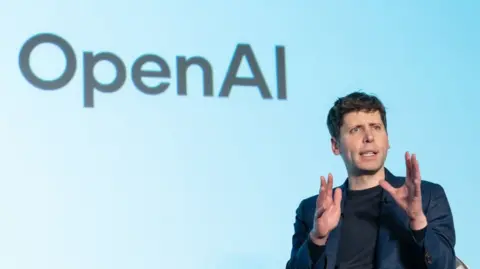
India's largest news organizations are looking to join a lawsuit against OpenAI, the US startup behind ChatGPT, for allegedly using their content without permission.
These news organizations include some of India's oldest publications like The Indian Express, The Hindu, The India Today Group, NDTV owned by billionaire Gautam Adani, and more than a dozen others.
OpenAI denies these claims and told the BBC that it uses "publicly available data" in accordance with "widely accepted legal precedents."
On Wednesday, OpenAI CEO Sam Altman was in Delhi to discuss India's plan for a low-cost AI ecosystem with IT Minister Ashwini Vaishnaw.
He stated that India "should be one of the leaders of the AI revolution" and referenced earlier comments from 2023.When he said Indian firms would struggle to compete, his comments were taken out of context.
"India is an incredibly important market for AI in general and for OpenAI in particular," local media quoted him as saying at the event.
The legal case filed against OpenAI in November by Asian News International (ANI), India's largest news agency, is the first of its kind in India.
ANI accuses ChatGPT of illegally using its copyrighted material, which OpenAI denies, and is seeking damages of 20 million rupees ($230,000; £185,000).
The case is significant for ChatGPT, given its plans to expand in the country. According to a survey, India already has the largest user base of ChatGPT.
Chatbots like ChatGPT are trained on massive datasets collected by crawling the internet. The content produced by nearly 450 news channels and 17,000 newspapers in India has huge potential for this.
However, there is no clear guidance on what material ChatGPT can legally collect and use for this purpose.
OpenAI is facing... at least a dozen lawsuits worldwide from publishers, artists, and news organizations, all accusing ChatGPT of using their content without permission.
The most notable lawsuit was filed by The New York Times in December 2023, where the newspaper demanded "billions of dollars" in damages from OpenAI and Microsoft, its supporter.
"A decision by any court could also influence similar cases globally," says Vibhav Mithal, a lawyer specializing in artificial intelligence at the Indian law firm Anand and Anand.
Mr. Mithal stated that the verdict in the lawsuit filed by ANI could "define how these AI models will operate in the future" and "what copyrighted news content can be used to train AI generative models [like ChatGPT]."
A court ruling in ANI's favor could lead to more legal cases and open the possibility of AI companies entering into license-sharing agreements with content creators, which some companies have already started doing.
"But a ruling in OpenAI's favor will allow more freedom to use copyrighted data to train AI models," he said.
